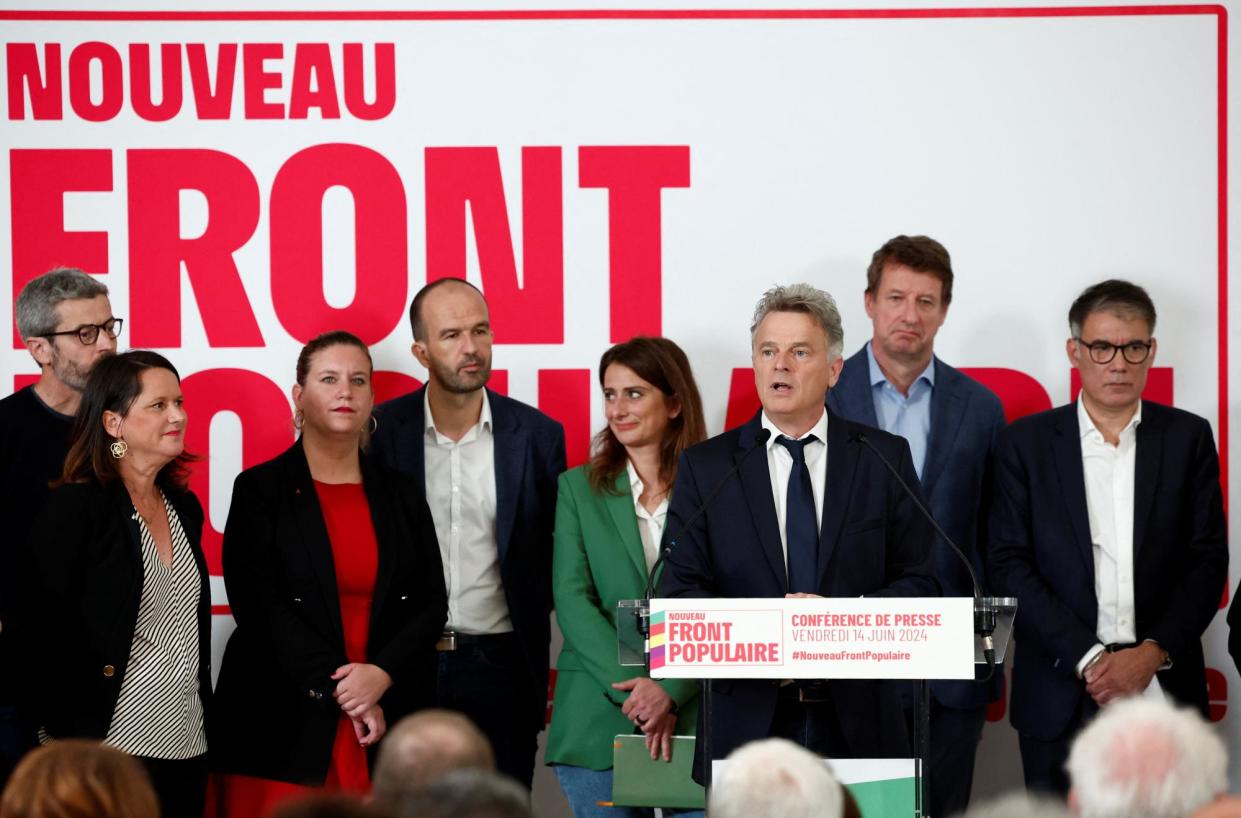French leftwing parties form ‘Popular Front’ to contest snap election

France’s four main leftwing parties have agreed to form a “New Popular Front” (NPF) to contest the snap election, as the far-right leader Marine Le Pen said she would seek a “national unity government” if her National Rally (RN) wins.
The Socialist party (PS), Greens, Communists and France Unbowed (LFI), led by the hard-left firebrand Jean-Luc Mélenchon, will campaign on a common platform and field a single joint candidate in each of the 577 parliamentary constituencies.
“A new page in the history of France has been written,” they said in a joint statement. Mélenchon tweeted his “warmest congratulations and thanks to our negotiators who had four sleepless nights” deciding on the programme and 577 candidates.
Macron called the snap ballot last Sunday after his list in the European elections suffered a crushing defeat at the hands of the RN, managing less than half the far-right party’s score. The vote will be held over two rounds on 30 June and 7 July.
The LFI MP François Ruffin said the left could now “start our campaign – with the aim of winning!”. Raphaël Glucksmann, who led a successful Socialist-backed list in the European elections, said he would also back the alliance.
“We can’t leave France to the Le Pen family,” Glucksmann told France Inter radio, adding that the NPF looked like the only way to prevent a far-right victory in the election, France’s most momentous in decades.
Glucksmann, whose list scored about 14% in the EU elections, just behind Macron’s camp, accused the president of “plunging France into chaos” and “opening the way to power for the far right”.
It was unclear who would lead the NPF and be its candidate for the post of prime minister. Glucksmann ruled out the bombastic and divisive Mélenchon, saying: “We need someone who can achieve consensus.”
Manuel Bompard, a senior LFI MP, said the alliance’s aim would be to “offer the country a complete break with the policies of Emmanuel Macron, so as to respond to the people’s most immediate needs, and to implement the necessary green transition”.
The NPF, presenting its policies on Friday, said its top priority if elected would be the cost of living crisis, which was “harming the lives and confidence of the French people”. It pledged to cap the price of essential foods, as well as electricity, gas and petrol.
The parties also said they would immediately reverse the unpopular pension changes pushed through last year by Macron’s government and return the French retirement age to 60, as well as overturning a more recent change to unemployment benefits and introducing a wealth tax.
They said France’s minimum wage and pension would be raised, while the NPF would also demand an immediate ceasefire in Gaza, recognise the state of Palestine, continue supplying necessary arms to Ukraine and legislate for carbon neutrality by 2050.
Related: French elections: who are the key players and what is at stake?
Polls suggest that the NPF, a repeat of the Nupes left-green alliance formed for France’s 2022 parliamentary elections, could run Le Pen’s RN, which is polling at just over 30% of the national vote, a close second in the snap election.
The coalition is on course to capture just under 30%, giving it more than enough deputies in the national assembly to prevent both Macron’s centrist coalition, forecast to lose half its MPs, and RN, which could double its tally, from forming a stable majority.
As Nupes, the same left-green alliance worked together in 2022 and 2023, before a leadership struggle, Mélenchon’s polarising character and policy differences - notably over the conflict in the Middle East – triggered its de facto collapse.
Campaigning in northern France on Friday, Le Pen said RN was on course to win the election, form a “government of national unity” and “pull France out of the rut”.
The RN leader added: “We will gather all French people – men and women of goodwill – who are aware of the catastrophic situation in our country.” It would be up to the 28-year-old RN president, Jordan Bardella, to “choose his team”, she said.
Infighting has continued in the centre-right Les Républicains (LR), the party of the former presidents Jacques Chirac and Nicolas Sarkozy, after its president, Éric Ciotti, unilaterally announced a surprise alliance with RN.
That prompted the rest of the party’s leadership to vote him out on Wednesday, and again on Friday, but Ciotti has continued to insist he is still the conservative party’s leader.
A Paris court on Friday overturned the decision to expel him. Ciotti posted on X: “The Paris court tribunal has suspended the move to expel me from the Republicans. I therefore continue to exercise my functions as party president.”
Speaking on BFM-TV on Friday, Bardella, France’s probable prime minister if the far-right party wins a majority in parliament, said the alliance between RN and LR would field joint candidates in roughly 70 constituencies. LR said no such deal was in place.

 Yahoo News
Yahoo News 
